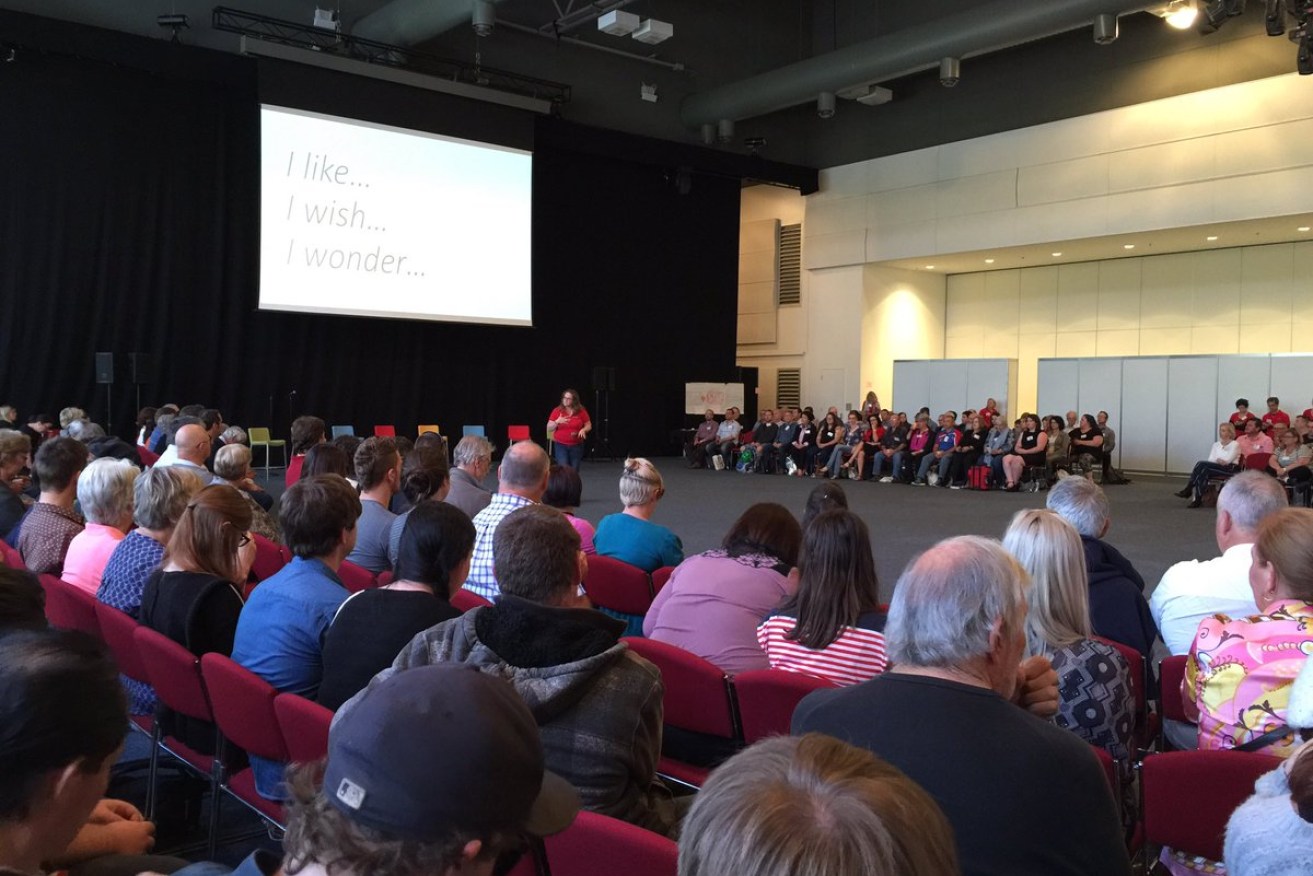REVEALED: Insiders’ critique of “problematic” nuclear jury
The body set up to oversee the nuclear royal commission’s consultation with the South Australian community has joined criticisms of the citizens’ jury process that comprehensively rejected the idea of a nuclear waste facility for the state, InDaily can reveal.


The jury about to present its report. Photo: Twitter/@yourSAyNuclear
The Consultation and Response Advisory Board to the nuclear fuel cycle royal commission will today deliver its report on the consultation processes – and it finds the 350-person second citizens’ jury was “unprecedented” in scale which “proved problematic as well as highlighting issues concerning witness selection and management”.
It also hinted that using the deliberative democracy forum for such as “complex and emotive” question might have been a misjudgement.
The concerns echo those raised by political scientist Haydon Manning, an expert witness to the jury, who wrote in InDaily last week that the process was chaotic and biased.
The designers of the jury process, the newDemocracy Foundation, indicated they also might harbour regrets about the size of the jury, but its executive director also took a slap at some critics who should “eat their words” for suggesting the jury was an attempt to manufacture consent.
The five-member advisory board – chair John Mansfield, Professor Deb White, Dr Rebecca Huntley, Parry Agius and Professor Daniela Stehlik – were responsible for ensuring that the jury processes were fair and impartial and that the report of the second jury reflected the “considered view” of participants.
Its report says the first citizens’ jury – with 50 participants – was a successful process, which produced the question for the second jury to consider.
However, in relation to the second jury – which reported earlier this month – the board raised a number of concerns.
“Importantly, the scale of CJ2 in terms of participants was, in the Board’s view, unprecedented and proved problematic as well as highlighting issues concerning witness selection and management,” its report says.
The board “notes and observed… some public criticism of the selection of witnesses on economic issues at CJ2”.
This deliberative process has not previously been used to consider such a complex or emotive issue
In relation to a minority report presented at the end of the jury, the board says “that there was some concern expressed as to the experience of some jurors attempting to influence others by putting pressure on them during the writing of this report”.
The board distanced itself from the jury process saying “it was not involved in either the selection of the CJ as a method, or the two service providers appointed (NewDemocracy Foundation and democracyCo)”.
“It is appropriate to comment here that this deliberative process, which incorporates the use of a CJ, has not previously been used in this State to consider such a complex or emotive issue.”
Iain Walker from the newDemocracy Foundation, the not-for-profit research group that designed the citizens’ jury process, said the foundation was reviewing what happened and would report back to the jurors and the State Government in a few weeks.
While he stressed he didn’t want to buy into the political debate which has emerged since the jury handed down its report, he suggested newDemocracy had learned some lessons.
“The themes you broadly raise (the concerns raised in the Consultation and Response Advisory Board report) – time will bear out that we don’t strongly disagree,” he said.
“Groups of 50 work really well; groups of 350 have a different social dynamic.”
He said the increased size of the second group was suggested by newDemocracy because, given the complex and emotive nature of the topic, they wanted to hear the views of a broad cross-section of the South Australian community.
Walker said the final result – a majority report which comprehensively rejected the concept of a high level nuclear waste dump – showed that criticisms of the process in the lead-up to the second jury had been misguided.
“The overwhelming amount of commentary in the lead-up to this was saying ‘it’s fixed – it’s manufacturing consent’. There are a whole bunch of people who now need to eat their words.”
democracyCo – the South Australian company engaged to run the process designed by newDemocracy – would not comment today.
The board’s general findings on the royal commission’s consultation processes were that it was “satisfied that the State-wide consultation process was undertaken in a respectful, unbiased and comprehensive manner”.
“The Board is strongly of the view that, if the Government decides to further consider the possibility proposed by the Report of the Nuclear Fuel Cycle Royal Commission, then continuous and transparent communication and consultation with the communities of South Australia, including the Aboriginal community, is critical to ensure the on-going building of trust in any ultimate decision by the Government which can then be supported by all South Australians,” its report says.
The royal commission’s 12-week consultation process included a social media strategy, three forums, formal and informal engagement with Aboriginal communities, town hall events and shopping centre visits.




